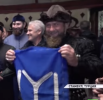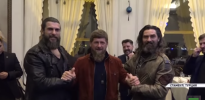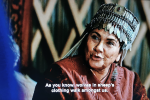Yes, the series gives a good image of what is happening now on earth, as we are all subject to a worldwide exercice (or lesson) with this covid story brought by our (sadly well real) psychopaths. This remind me the comment a micro scale my colleague wrote me on our internal chat, which was one of his conclusion after having finished the series, i copy/paste it again here :
The series has taught me a lot of things and the thing that has marked me the most is that one must always stay on the side of the good guys, no matter who is facing and what the consequences are
Indeed, the series help us, or at least mysef and visibly my colleague,, to resist and remain a righteous person. The only word that comes to my mind here is "
inspiration". This series, mainly Ertugrul (
but also others, like one i much liked in season 3 : Aliyar, i won't spoil more 
), is a great lesson of inspiration, of what heroes can bring for good. And the lenght of the series can be seen as a long example which allow for many people to get inspired (as i suppose that ... the sensitivity to be inspired is different from one to the other, so a long series is helpful to ... achieve the job

).
If we can vote for some next questions to the C's, then ... i would vote for this one : Was the Ertugrul series inspired by you (the C's) ?




 to me that when the kid translated Ertugrul name meaning valiant man that Ertugrul as son of a tribal''king'' is Prince Valiant !
to me that when the kid translated Ertugrul name meaning valiant man that Ertugrul as son of a tribal''king'' is Prince Valiant ! ), is a great lesson of inspiration, of what heroes can bring for good. And the lenght of the series can be seen as a long example which allow for many people to get inspired (as i suppose that ... the sensitivity to be inspired is different from one to the other, so a long series is helpful to ... achieve the job
), is a great lesson of inspiration, of what heroes can bring for good. And the lenght of the series can be seen as a long example which allow for many people to get inspired (as i suppose that ... the sensitivity to be inspired is different from one to the other, so a long series is helpful to ... achieve the job  ).
).
